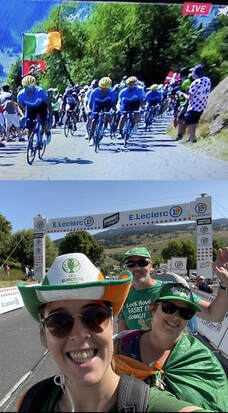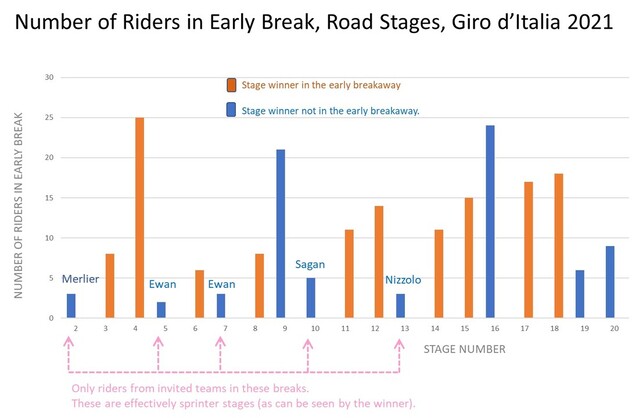
The role of the director in keeping the stage running on time depends greatly on coopetition. This concept is examined in detail by Brandenburger and Nalebuff in their 2021 Harvard Business Review piece. They published a book with the same name in 1996. Coopetition is essentially some cooperation between competitors. In cycling term, cyclists from competing teams cooperating for a successful breakaway to have the chance of winning a stage. The early breakaway not only keeps the speed of the stage within the race director's limits, but simultaneously increases the excitement of the race for the spectators early in the stage. Additionally, the cyclists themselves benefit from participation in the breakaway because of television coverage for their team sponsors, while having the potential to succeed in intermediate categories.
The graph below highlights the number of riders in the early breakaway throughout the last year’s Giro, with a relatively even spread between successful and unsuccessful breaks. However, on five particular stages the breakaway was composed only of riders from these invited teams. From the small size of the break and the stage winner of each of these stages it’s clear that these were days earmarked by the sprinters and their teams, who have the sole purpose of keeping the breakaway in check so the sprinters can battle it out in the final metres. These stages can be dull until the final kilometres, with low viewership throughout the stage, which is why McQuaid, as referenced in Larson and Maxcy (2014) and blog post of May 13th, pushed for more breakaways early in the day, even on flat sprint stages, as would have been expected in stage 6 of this year’s Giro. These are the days when the invited team can show their value to the race, increasing the drama throughout the stage, securing a place for the following year, and ensuring greater television time for sponsors, basically keeping everyone happy, despite the elusive stage victory for the riders who battle at the front all day!
The lack of breakaway in stage 6 of the 2022 Giro came much to the disappointment and confusion of Eurosport commentators Sean Kelly and Carlton Kirby. Eurosport’s chief cycling reporter, Kirby, highlighted that the reasons behind the lack of a breakaway can only be explained by riders and teams themselves in interviews following the stage. In addition to some quantitative analysis, I’m taking a interview-based qualitative approach to breakaways in my Master dissertation (MSc Business Economics at UCC). To date I have interviewed experts from across the world of cycling including: Eurosport reporters Kirby and Felix Lowe; former British cyclist and current Eurosport journalist Dan Lloyd; Global Cycling Network reporters Joe Timms and Cillian Kelly; former editor of ProCycling magazine and author of numerous award-winning books on cycling Peter Cossins; as well as Irish cycling hero, Grand Tour winner and current Eurosport commentator Sean Kelly. These experts, amongst the best in the sport, have been invaluable contributors to my master’s thesis on coopetition in breakaways, allowing for a more detailed understanding of the complex dynamics within the peloton, building on previous quantitative studies in the area. Their willingness to help is a great reflection on the cycling community.
Looking forward to July in France.
(Jane O'Sullivan is currently completing her MSc Business Economics.)

 RSS Feed
RSS Feed